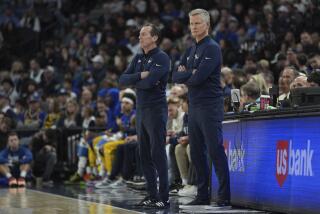49ers, Walsh Help to Open the Door to Black Coaches
- Share via
ROCKLIN, Calif. — There is a sure way for experienced, talented young college coaches to improve their coaching methods, Bill Walsh was saying here a year ago.
The coach of the San Francisco 49ers since 1979, Walsh remarked: “Any (young coach) is bound to get something out of an intimate training-camp association with a veteran pro staff.”
Not that pros are better qualified than a college staff, he said, but their principles and prescriptions tend to be somewhat different.
When Walsh made these comments, he said he was thinking mainly of the scarcity of employment opportunities for young black coaches.
Last spring, he acted, setting up the National Football League’s first black coaching fellowship program.
Applications were solicited from the universities of four conferences--the Pacific 10, Western Athletic Conference, Pacific Coast Athletic Assn. and Southwest--and after a screening process, Walsh interviewed the finalists.
Intending to select only one, he chose two instead--Jerry Brown, 37, offensive coordinator at Cal State Fullerton, and Tyrone Willingham, 33, defensive backfield coach at Rice.
Each got a 49er fellowship providing room, board, a car and several weeks of personal involvement with 49er coaches, plus a $1,500 stipend.
Talking about the program recently at Rocklin’s Sierra College, where the 49ers are camping again this summer, Brown said: “The advantage is that you learn what it’s like at this level without having to (perform) as a coach.
“It’s better this way than getting thrown into a situation (as a rookie assistant) and then having to pick everything up.”
As a coaching fellow, Brown worked the 49ers’ full training-camp regimen, joining the coaches at 7 a.m. for their first meeting each day and sitting in with them the rest of the time--at four other meetings and two long practices--until 11 p.m., when the workday ends at Rocklin.
“I listened a lot, but tried not to talk too much,” said Brown, a 1970s defensive back at Northwestern who coached at Eastern Illinois before moving to the Fullerton staff in 1980.
A studious but outgoing type, Brown impressed the 49ers all the way.
As Walsh said: “Jerry is very much prepared right now to be a head coach.”
And that, of course, is the sort of judgment that rings a bell today in the little world of football.
Black coaches and their pro prospects have been quite on the minds of pro and college administrators since last spring, when Al Campanis was fired by the Dodgers for publicly questioning the leadership qualities of blacks.
It was quickly pointed out by many that Campanis’ thinking reflected a majority view in the white controlled structure of nearly all sports, not just baseball.
This problem has produced few profound answers from pro football, but at least the NFL has a black-assistance program.
For the last several years, the pros have been inviting the coaching staffs of various predominantly black colleges to spend part of each summer at NFL training camps, expenses paid, including transportation.
This summer, for example, Coach George Moody and six members of his staff from Virginia State University were here for a couple of weeks.
That was in addition to the 49er fellowship operation, which serves to complement the league’s program, in that it stresses individual attention to one or two individuals.
At the NFL convention in San Diego last March, the 49er program was described and recommended by Walsh and 49er owner Edward J. DeBartolo Jr.
“We’re confident that it will help make a difference,” DeBartolo said.
Dr. Harry Edwards, the University of California sociologist, and others are predicting that the Campanis incident will have a benign effect on sports in the long term. And at Rocklin, the fellowship winner from Fullerton said he agrees.
“(Campanis) opened a lot of eyes,” Brown said. “We’ll have to see what follows. Personally, I’m one to be patient, but some guys aren’t--and that’s fine with me, too.
“The one thing I’m sure of is that there will be more (upward) movement now.”
Walsh thinks so, too. One of the few NFL coaches with four black assistants, Walsh, who doubles as 49er president, also has three black executives in key administrative positions.
The two fellowship coaches worked in smoothly here.
Said 49er liaison Rodney Knox: “We’ve enjoyed having the Virginia group and the other groups with us in the years since the NFL program began.
“But it’s obvious that Coach Walsh was right when he said that one or two can get more out of it than a large group of coaches. Our coaching staff has been giving Brown and Willingham more one-on-one attention than any group could get.”
Said Brown: “(The 49er coaches) have been extremely helpful and involved. I’ve been able to go one-on-one with Coach Walsh any time I wanted.”
Brown said that he had applied for a 49er fellowship for two reasons.
“I wanted to know what it’s like to coach at the pro level,” he said. “And I wanted to watch (pro coaches) deal with players.”
He said that his interest in the 49ers began in 1972, when they drafted him in the ninth round.
“They cut me that summer, then I went on to the Rams as a defensive back,” Brown said. “They cut me there, too.
“It broke my heart that I couldn’t stick in pro ball. My career plan was to play 10 years and then go into coaching.”
There has never been anything else he wanted to do.
“The kind I am, I’ve got to have a job that doesn’t seem like work,” he said. “I don’t care how long the hours are if it isn’t work. And football isn’t work.”
Brown said that, from the first, he benefited most from the night seminars with Walsh and the other coaches, who end each day by discussing every San Francisco player--his strengths, weaknesses and attitudes as perceived that day in player meetings and at practice.
“The (49er coaches) really learn their personnel--and football is personnel,” Brown said. “It’s the players who win or lose.
“If you know exactly what a player can and can’t do, you can put him in situations that he can handle, and keep him out of situations that he can’t.”
Somewhat the same is true of coaches.
“The more you’ve been around, the better,” Brown said. “It’s important to work a while with a pro staff.”
More to Read
Go beyond the scoreboard
Get the latest on L.A.'s teams in the daily Sports Report newsletter.
You may occasionally receive promotional content from the Los Angeles Times.










